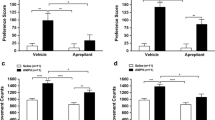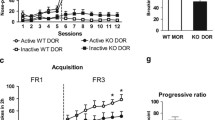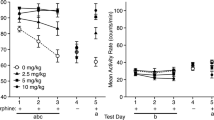Abstract
Rationale
Opioid receptor antagonists have been shown to attenuate the rewarding and addictive effects of cocaine. Furthermore, cocaine has been shown to cause the release of beta-endorphin, an endogenous opioid peptide.
Objective
We assessed whether this neuropeptide would play a functional role in cocaine-induced motor stimulation and conditioned place preference (CPP).
Materials and methods
Mice lacking beta-endorphin and their wild-type littermates were habituated to motor activity chambers for 1 h, then injected with cocaine (0, 15, 30, or 60 mg/kg, intraperitoneally) or morphine (0, 5, or 10 mg/kg, subcutaneously), and motor activity was recorded for 1 h. In the CPP paradigm, mice were tested for baseline place preference on day 1. On days 2 and 3, mice received an alternate-day saline/cocaine (15, 30, or 60 mg/kg) or saline/morphine (10 mg/kg) conditioning session and then tested for postconditioning place preference on day 4.
Results
Cocaine-induced motor stimulation and CPP were both reduced in mice lacking beta-endorphin. On the other hand, motor stimulation and CPP induced by morphine were not altered in mutant mice.
Conclusion
The present results demonstrate that the endogenous opioid peptide beta-endorphin plays a modulatory role in the motor stimulatory and rewarding actions of acute cocaine.




Similar content being viewed by others
References
Amalric M, Cline EJ, Martinez JL Jr., Bloom FE, Koob GF (1987) Rewarding properties of beta-endorphin as measured by conditioned place preference. Psychopharmacology (Berl) 91:14–19
Bardo MT, Bevins RA (2000) Conditioned place preference: what does it add to our preclinical understanding of drug reward? Psychopharmacology (Berl) 153:31–43
Belluzzi JD, Stein L (1977) Enkephaline may mediate euphoria and drive-reduction reward. Nature 266:556–558
Houdi AA, Bardo MT, Van Loon GR (1989) Opioid mediation of cocaine-induced hyperactivity and reinforcement. Brain Res 497:95–198
Hummel M, Ansonoff MA, Pintar JE, Unterwald EM (2004) Genetic and pharmacological manipulation of mu opioid receptors in mice reveals a differential effect on behavioral sensitization to cocaine. Neuroscience 125:211–220
Kelsey JE, Carlezon WA Jr, Falls WA (1989) Lesions of the nucleus accumbens in rats reduce opiate reward but do not alter context-specific opiate tolerance. Behav Neurosci 103:1327–1334
Kim HS, Park WK, Jang CG, Oh KW, Kong JY, Oh S, Rheu HM, Cho DH, Kang SY (1997) Blockade by naloxone of cocaine-induced hyperactivity, reverse tolerance and conditioned place preference in mice. Behav Brain Res 85:37–46
Kosterlitz HW, Hughes J (1975) Some thoughts on the significance of enkephalin, the endogenous ligand. Life Sci 17:91–96
Marquez P, Baliram R, Gajawada N, Friedman TC, Lutfy K (2006) Differential involvement of enkephalins in analgesic tolerance, locomotor sensitization, and conditioned place preference induced by morphine. Behav Neurosci 120:10–15
Mogil JS, Grisel JE, Hayward MD, Bales JR, Rubinstein M, Belknap JK, Low MJ (2000) Disparate spinal and supraspinal opioid antinociceptive responses in beta-endorphin-deficient mutant mice. Neuroscience 101:709–717
Olive MF, Koenig HN, Nannini MA, Hodge CW (2001) Stimulation of endorphin neurotransmission in the nucleus accumbens by ethanol, cocaine, and amphetamine. J Neurosci 21:RC184
Rademacher DJ, Steinpreis RE (2002) Effects of the selective mu(1)-opioid receptor antagonist, naloxonazine, on cocaine-induced conditioned place preference and locomotor behavior in rats. Neurosci Lett 332:159–162
Roth-Deri I, Schindler CJ, Yadid G (2004) A critical role for beta-endorphin in cocaine-seeking behavior. Neuroreport 15:519–521
Roth-Deri I, Zangen A, Aleli M, Goelman RG, Pelled G, Nakash R, Gispan-Herman I, Green T, Shaham Y, Yadid G (2003) Effect of experimenter-delivered and self-administered cocaine on extracellular beta-endorphin levels in the nucleus accumbens. J Neurochem 84:930–938
Rubinstein M, Mogil JS, Japon M, Chan EC, Allen RG, Low MJ (1996) Absence of opioid stress-induced analgesia in mice lacking beta-endorphin by site-directed mutagenesis. Proc Natl Acad Sci USA 93:3995–4000
Slugg RM, Hayward MD, Ronnekleiv OK, Low MJ, Kelly MJ (2000) Effect of the mu-opioid agonist DAMGO on medial basal hypothalamic neurons in beta-endorphin knockout mice. Neuroendocrinology 72:208–217
Wise RA (1989) Opiate reward: sites and substrates. Neurosci Biobehav Rev 13:129–133
Wise RA, Hoffman DC (1992) Localization of drug reward mechanisms by intracranial injections. Synapse 10:247–263
Acknowledgments
The author would like to thank Drs. Rajan Radhakrishnan and Charles Young for reviewing the article. We also express our gratitude to Alexander T. Nguyen and Abdul Hamid for technical support. The present study was supported in part by an intramural grant from the Western University of Health Sciences and in part by a MIDARP Grant R24 DA017298-02 to Dr. Theodore C. Friedman and in part by a NIDA Grant DA016682-03 to KL.
Author information
Authors and Affiliations
Corresponding author
Rights and permissions
About this article
Cite this article
Marquez, P., Baliram, R., Dabaja, I. et al. The role of beta-endorphin in the acute motor stimulatory and rewarding actions of cocaine in mice. Psychopharmacology 197, 443–448 (2008). https://doi.org/10.1007/s00213-007-1053-z
Received:
Accepted:
Published:
Issue Date:
DOI: https://doi.org/10.1007/s00213-007-1053-z




